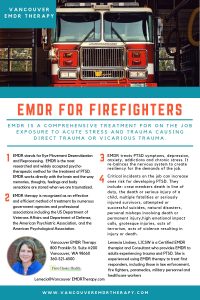 Emotional health should be looked at on par with physical health. If left untreated, conditions such as depression, post-traumatic stress, and anxiety are no less debilitating than diabetes, hypertension, or heart disease. Emotional stress can severely impact ones motivation at work and enjoyment of life. The good news is that stress related emotional issues can be treated by evidenced based therapy such as EMDR (Eye, Movement, Desensitization, Reprocessing) therapy.
Emotional health should be looked at on par with physical health. If left untreated, conditions such as depression, post-traumatic stress, and anxiety are no less debilitating than diabetes, hypertension, or heart disease. Emotional stress can severely impact ones motivation at work and enjoyment of life. The good news is that stress related emotional issues can be treated by evidenced based therapy such as EMDR (Eye, Movement, Desensitization, Reprocessing) therapy.
Firefighters encounter situations the public rarely, if ever, must face. These experiences go beyond the basic behavioral health risk factors most people face.
Firefighters:
- Are exposed to potentially traumatic events at a higher rate than the mainstream population;
- Must remain “on alert” even while resting;
- Often have sleep-disrupting shifts;
- Are separated from families and friends for unusual periods of time due to shift work, deployments or other work-cycle formats.
 The fire service has several built-in protective factors that promote resiliency, such as a sense of belonging and support from one another; an enduring sense of purpose; and often a strong sense of gratitude and respect from the public. However, sometimes firefighters need professional help working with the body and mind to reduce the impact of stress.
The fire service has several built-in protective factors that promote resiliency, such as a sense of belonging and support from one another; an enduring sense of purpose; and often a strong sense of gratitude and respect from the public. However, sometimes firefighters need professional help working with the body and mind to reduce the impact of stress.
A firefighters body can be greatly affected by stress. Stress affects all body systems. Intense physical demands; hot, heavy and restrictive gear; and the difficult working conditions experienced by firefighters can amplify these reactions. Stress causes the “fight or flight” response controlled by the sympathetic nervous system, to kick in. Adrenal glands release adrenaline and cortisol hormones, which increase heart rate, blood pressure, and glucose levels. More blood is pumped through the heart and large muscles. With chronic stress, the body’s systems may not be able to return to normal. Fatigue, cravings for sugary foods, excessive alcohol use, depression and irritability are some symptoms of the effects of chronic stress. Over time, these responses can damage the body’s systems in a myriad of ways, from an increase in coronary artery inflammation to weight gain to insomnia, to a name a few.
EMDR works with the mind and the body by addressing the experiences that cause stress. Traumatic memories and distressing experiencing both on the job and in personal life are addressed. EMDR can target the body based responses of fight, flight and freeze and address negative feelings such as; powerlessness, helplessness, lack of control, shame and failure which can be common for firefighter’s experiencing on the job stress.
To learn more about how EMDR therapy can help you decrease your stress and increase your motivation both at work and in life please click here-EMDR for Firefighters





